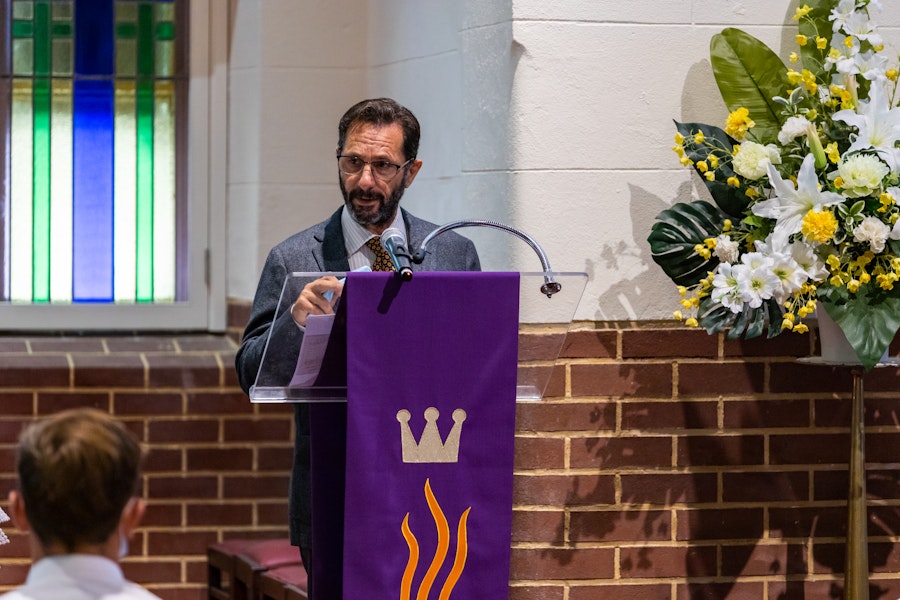
A challenge for Lent
Since I wrote to you a couple of things have happened that have been playing on my mind. Firstly, last Wednesday our College celebrated Ash Wednesday and so began the season of Lent. The ceremony was livestreamed from the Chapel and, as always, the boys responded beautifully and respectfully. A few days later, on Saturday morning, I awoke to the news that Shane Warne had died. Now what these two things have to do with each other is difficult to explain if you aren't inside my brain, but Lent is a very reflective time and when someone who is so well known for living life to the full expires so suddenly, prematurely and unexpectedly, the cogs inside my head start spinning.
In Shawshank Redemption, Andy Dufresne says to Red that he can "Get busy living or get busy dying. Remember, Red, hope is a good thing. Maybe the best of things and no good thing ever dies." For such a larger than life character as Warne to die so suddenly has been a little unsettling to me, and coupled with the death of my childhood hero Rod Marsh, it reminds me of my own mortality.
Everyone you've ever known will someday die. According to some psychologists, this uncomfortable truth constantly lurks in the back of our minds and ultimately drives everything we do, from choosing to attend church, eat vegetables and go to the gym, to motivating us to have children, write books and create companies.
For healthy people, death usually lurks in the back of our minds, exerting its influence on a subconscious level. "Most of the time, we go through our days unaware, not thinking of our mortality," says Chris Feudtner, a pediatrician and ethicist at the Children's Hospital of Philadelphia and the University of Pennsylvania. "We cope by focusing on the things more directly in front of us."
Feudtner goes on to ponder: "What would happen, though, if the ambiguity surrounding our own demise were taken away? What if we all suddenly were told the exact date and means of our deaths? While this is, of course, impossible, careful consideration of this hypothetical scenario can shed light on our motivations as individuals and societies – and hint at how to best spend our limited time on this Earth."
Christ knew from the get-go both the means and the timing of his death. He died for our sins and gave us eternal hope through his resurrection, and subsequently our promised resurrection. He left a legacy of how to treat others that is immutable. His model of how to live one's life is at the centre of our faith and school, and yet I wonder how many times Christ is referenced in the homes of our CBC families.
My challenge to our community, Catholic or not, is to find some time to gather as a family during the Lenten season and discuss its meaning.
Lent is meant to be a time of repentance, alms-giving, reflection and prayer. My challenge to our community, Catholic or not, is to find some time to gather as a family during the Lenten season and discuss its meaning. Given all the grief in the world at the moment, giving something up as a family may build a connection between you and a kinship with our sisters and brothers who are suffering in Australia and beyond. Your sons have brought home a Caritas Project Compassion box that raises much-needed funds for this incredible organisation. Ensuring it is filled to the extent your son can afford and returning it should be encouraged. Spending a little quiet time reflecting on the joys in your life as well as a stocktake of your priorities might just help to make sense of the nonsensical.
You have all probably heard of Bronnie Ware, an Australian nurse who spent several years working in palliative care, caring for patients in the last 12 weeks of their lives. She recorded their dying epiphanies in a blog called Inspiration and Chai, which gathered so much attention that she put her observations into a book called The Top Five Regrets of the Dying. Ware writes of the phenomenal clarity of vision that people gain at the end of their lives, and how we might learn from their wisdom.
"When questioned about any regrets they had or anything they would do differently," she says, "common themes surfaced again and again." The top five regrets were:
- I wish I'd had the courage to live a life true to myself, not the life others expected of me.
- I wish I hadn't worked so hard.
- I wish I'd had the courage to express my feelings.
- I wish I had stayed in touch with my friends.
- I wish that I had let myself be happier.
Benjamin Franklin said that nothing is certain except death and taxes. That certainty for me is somewhat ameliorated by a great accountant and the hope of resurrection made possible by Christ's sacrifice, but I do want to live the best life possible. This Lenten season, in the winter of my work years, I will seek to find some clarity about where I've been, where I'm at and where I want to be. Finding the time is the challenge for all of us and I wish you well in searching for that solitude and reflective opportunity. In the lead up to our most important Liturgical celebration, I wish you all peace, joy, patience and health and hope that, like the strongest steel that is forged in the hottest fire, in this difficult moment of COVID-19, societal division, isolations, opportunities lost or restricted, you find some family time to strengthen your bonds and provide your sons with some clarity about the meaning of Lent and how he can add value to a world that needs more selfless people more than ever.
Mr Domenic Burgio
Principal



